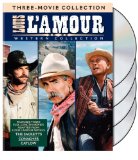| Reviews & Columns |
|
Reviews DVD TV on DVD Blu-ray 4K UHD International DVDs In Theaters Reviews by Studio Video Games Features Collector Series DVDs Easter Egg Database Interviews DVD Talk Radio Feature Articles Columns Anime Talk DVD Savant Horror DVDs The M.O.D. Squad Art House HD Talk Silent DVD
|
DVD Talk Forum |
|
|
| Resources |
|
DVD Price Search Customer Service #'s RCE Info Links |
|
Columns
|
|
|
Louis L'Amour Western Collection (The Sacketts/Conagher/Catlow), The
Louis L'Amour is a titan in Western fiction. His bibliography just breaks the triple digits mark and naturally, many have been adapted onto the big (and small) screen. Warner collects three previously released L'Amour adaptations in the "Louis L'Amour Western Collection." The result is an interesting mix of comedy, character study, and classic Western storytelling.
Catlow
Richard Crenna is Ben Cowan, a US Marshal hot on the trail of an (initially) unnamed fugitive. "Catlow" opens with a tense cat-and-mouse sequence of Cowan tracking this unseen figure through a labyrinth of dusty hills. We don't know whom Cowan is tracking, but we know he must be important, as Cowan sports an intense look of determination, with a hint of fear. That hint of fear turns out to be wisely worn, but not heeded well enough, when Indian arrows fall our hero.
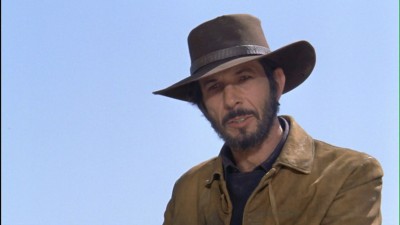
This is no trick, where we get the ending first and have to see how our hero got there. No, what we get is an abrupt shift to comedy as Cowan's prey, Jed Catlow, general ne'er do-well, shows up and saves the film's protagonist in the form of Yul Brynner. Unfortunately, Yul Brynner is (mostly) the only thing "Catlow" has to keep viewers partially interested for the next 95 minutes. The film is a bizarre sight to witness. Packed full of clichés, the one glimmer of hope for tension arrives in the form of Leonard Nimoy, playing completely against type as the bounty hunter, Miller. A man determined to end Catlow's days of cattle rustling, putting him in direct opposition with Cowan who desires to bring Catlow to justice, while still feeling stifled feelings for his old friend (yes, they even roll out the vintage, former friends angle) who did save his life.
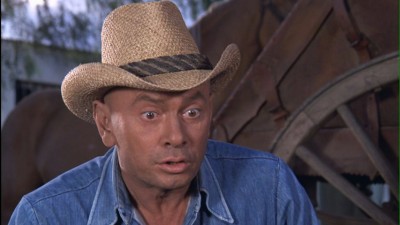
Director, Sam Wanamaker, never exhibits a firm grasp of how to handle a Western-comedy, and frankly, it's no easy task. "Catlow" tries to remain one-part stock Western, while brining the laughs in both broad and fine strokes. Brynner does all he can to salvage both angles; he is a natural screen presence who instantly sells the idea of a sarcastic outlaw. Even obvious gags such as a gun in the boot feel fresh with Brynner's spin. Likewise, Crenna, does a good job of selling the comedy whenever he's on-screen with Brynner or in close proximity. However, where things fall apart, is the in between moments, when Wanamaker sets up a tedious robbery angle.
Despite some memorable action set pieces, including a fight between Catlow and Miller that are comparable to a much lighter version of the infamous, sauna fight in "Eastern Promises," the movie is just plain dull. It competently drags its feet from scene to scene, but in the end, only manages to jog for a brief time. "Catlow" is more like a TV-movie that was intended to be a backdoor pilot for a show which never materialized; while I have nothing to back that claim up with, I would cite the "CHiPs" like ending to be a start to a strong case for it. There are lot worse Western comedies than "Catlow," but in no way is it able to hold it's own against the likes of "Blazing Saddles," "Cat Ballou," "Little Big Man," or even "Maverick."
RATING: 2.5/5.0
REPLAY: 1.5/5.0
Conagher
I'll be very upfront when it comes to "Conagher." I revisited this 1991 film with fear of heavy bias; I first watched it with my dad around the time it debuted on TNT and again on VHS about a decade ago. We had both liked it a great deal and watching it with him was a good memory. That said, I was able to look at the film and detach my own personal feelings from it and in the process, see it was not as perfect as I had remembered.
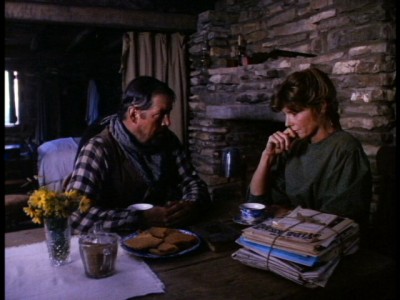
Sam Elliot and his mustache step into the dusty boots of Conn Conagher, a decidedly stock Western archetype. Conagher is a world-weary cowboy, looking to make an honest buck, so, in his own words, "he can put up his boots for winter." However, we don't meet Conagher for quite some time. Instead the story starts with Evie Teale (Katherine Ross and real-life wife of Sam Elliot) and her two children. Evie has been left to hold down the home front when her husband leaves for business. In his absence, Evie, turns the home into a stop for the stagecoach, setting up her strive for full independence, knowing in the back of her mind, her husband won't return. The film takes an admirable length of time before Evie and her children finally face the fact, he won't be back (not a spoiler by the way, as his demise comes on screen, within the first five minutes).
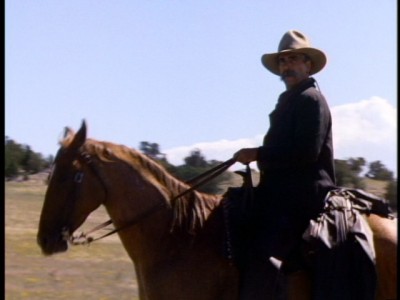
Evie's independence sets the stage for some interesting encounters, both directly and indirectly. There's an exciting shootout between Evie, some men from the Stagecoach and some Indians, but more importantly, some less than honest hired hands. This is where Conagher steps in to play his part. Elliot never draws the spotlight on himself, which is no easy feat. He instead, plays Conagher as someone trying to distance himself from the events playing out in his path. If anything, the viewer learns a lot about Conagher through how those around him act and pull him into to the web. That's not to say Conagher is a pacifist; as expected, he's eventually pushed enough to establish dominance as a man not to be trifled with.
At the same time, there's a well-plotted (between the lines) romance between Conagher and Evie. Ross and Elliot's, real life marriage is a tremendous asset to this film, with the two characters feeling incredibly natural together. It's also worth mentioning both Ross and Elliot helped write the screenplay, so the strong, but again, never spotlight stealing portrayal of both characters, from two different worlds feels incredibly real. "Conagher" is one of those movies that carves out a chunk of the world and draws viewers into the proceedings. We see what life is like both for a frontier widow as well as an aging cowboy; we see how many things never change, both for the good and bad.
"Conagher" is a slow moving film, clocking in at nearly two-hours. It could have used a bit tighter editing in places, because despite the need for the plot to unfold at a natural pace, there are times where it events begin to spin their own wheels. "Conagher" isn't the perfect Western I remember, but it's still a damn fine one. It's a Western tale that just isn't told much anymore, one of real people, living their lives. Yes, the characters are stock, the events are often cliché, and the tired stereotype of evil Indians was a bit disheartening, but the performances and overall story are too solid to ignore. There's no fairytale ending here (the cliché is often used a set-up to something better) nor superhuman showdown; just an honest to goodness attempt at realism, with just a dash of melodrama for the masses.
RATING: 3.5/5.0
REPLAY: 3.5/5.0
The Sacketts
"The Sacketts" are a reminder of a bygone era in television entertainment. Entering the homes of viewers in 1979, viewers were introduced to the Sackett Family. What is most striking, in retrospect, is two of the three Sackett brothers, Tell and Orrin, were played respectively by two actors on the brink of stardom: Sam Elliot and Tom Selleck. Joined by newcomer Jeff Osterhage as Ty Sackett, all three men hold their own against the likes of Hollywood legends Glenn Ford, Ben Johnson, Jack Elam, and the often underappreciated, John Vernon. The story adapted from the Louis L'Amour novels, "Sackett" and "The Daybreakers," and wastes no time in establishing an epic three hour journey for viewers.
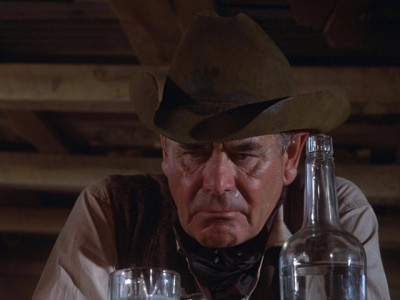
To be quite frank, my expectations were quite high, as "The Sacketts" appeared to be a sure fire hit. The journey I was taken on was by all means enjoyable, but like the other two films in this set, could have used the hand of a master editor. While nowhere as near uneven or ill paced as "Catlow," "The Sacketts" largely succeeds on the efforts of the cast. Over the course of the miniseries we follow the Sackett boys through various ups and downs. Orrin and Ty stick together following the murder of Orrin's wife in the film's opening scene. For those who love classic Western storytelling, the story of Ty and Orrin will surely delight. The strongest portion of the miniseries revolves around Ty and Orrin learning the ways of being real cowboys from a seasoned veteran, Tom Sunday (Glenn Ford). Ford, as expected, is nothing short of amazing, bringing his years of experience on-screen and in particular, in the Western genre, to the table.
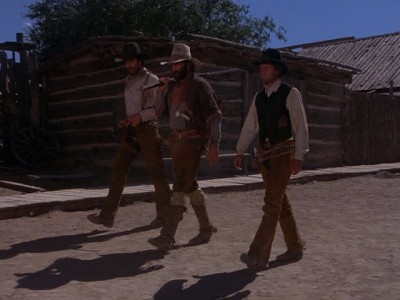
As stated above though, "The Sacketts" is long and eventually, it begins to feel a bit repetitive. The story isn't just about Ty and Orrin, but also Tell, whose existence remains unknown to his siblings. Tell's story is consistently entertaining though and Elliot mixes his trademarked, no-nonsense attitude with the hidden emotions of a man traumatized by his Civil War experiences. Selleck and Osterhage are no slouches themselves, with the latter leaving me wondering why he never joined Selleck and Elliot with major success. The only thing that detracts from their performances is the repetition; when Ty was forced into yet another showdown, I couldn't help but channel GOB Bluth and yell "Come on!"
"The Sacketts" is well worth a watch, but the final product doesn't live up to expectations. It's overly long and never as deep as it could be. It's good Western storytelling, not bad, but not great. The price of admission is justified by the performances, in particular Glenn Ford and Jeff Osterhage's. One is (nearly) the final of a legend and the other is a glimpse of talent never properly rewarded. Ultimately, nothing new is brought to the table, but what is, at least, is mostly satisfying.
RATING: 3.0/5.0
REPLAY: 2.5/5.0
THE DVD
The Video
Catlow
"Catlow" is presented with an anamorphic 1.85:1 widescreen transfer. The biggest flaw with the transfer is an inconsistent level of grain, with many exterior and establishing shots looking ten or more years older than interiors and character close-ups; some minor print damage pops up from time to time as well. Color levels appropriately capture the Western atmosphere, although some artificial tinkering to make daytime scenes appear to be nighttime scenes, stick out like a sore thumb. Detail levels vary with close-ups showing the transfer's strongest aspects, despite some mild edge enhancement.
VIDEO RATING: 3.5/5.0
Conagher
"Conagher" is presented in its original 1.33:1 aspect ratio and is a shining example of how not to do a DVD transfer. Despite being the newest of all three movies, it's an ugly transfer, that doesn't seem far removed from the VHS copy I had viewed. Even at it's strongest, the picture appears a bit washed out or muddy; when one of many nighttime scenes show up, it's a struggle to tell what's going on and the red levels appear artificially high. In general, this looks like a movie shot cheaply on video and then transferred cheaply. Warner has really fallen down on the job when it comes to "Conagher" and in botching this transfer, they undermine the understated simplicity of the film's setting. It's a third rate effort.
VIDEO RATING: 2.0/5.0
The Sacketts
"The Sacketts" is presented in its original 1.33:1 aspect ratio and of the three films is the most consistent transfer. Detail is quite sharp, while grain, ever present, is never overpowering. Color levels feel a tad artificially intense, but I can't honestly determine whether this is a filmmaker's choice or the result of third party tinkering. Either way, there's nothing glaringly wrong with the transfer and for a 1979 TV movie looks better than most would expect.
VIDEO RATING: 4.0/5.0
The Audio
Catlow
"Catlow'" English mono audio track is perfectly serviceable. Dialogue is clear and distortion free, but the sound effects don't fare as well experiencing some high-end distortion and an overall lack of life. English subtitles are included.
AUDIO RATING: 3.0/5.0
Conagher
Following suit with their mishandling of the video transfer, Warner incorrectly lists "Conagher's" audio track as being English mono, when in fact it is a standard stereo track. It's a solid track overall, but at times fails to fully pull viewers into the few intense scenes where business picks up.
AUDIO RATING: 3.5/5.0
The Sacketts
"The Sacketts" is presented with a standard English mono track; effects are well mixed alongside dialogue and everything is largely distortion free. It's a solid mono track that does it's best to remain consistent from open to close. French and Spanish subtitles are included.
AUDIO RATING: 3.5/5.0
The Extras
The lone extra on the entire set is the theatrical trailer for "Catlow."
Final Thoughts
To be honest, if I had to choose to buy any of the film's in this collection separately, "Conagher" is the only one I'd add to my collection. Overall, the "Louis L'Amour Western Collection" is a mild letdown. None of the movies presented here are classics; "Conagher" and "The Sacketts" are the stronger of the two films, while "Catlow" remains a curious footnote in the history of the genre. The casual Western fan and the movie going population in general are best left renting the films here; only more seasoned genre aficionados should consider a purchase. Rent It.
|
| Popular Reviews |
| Sponsored Links |
|
|
| Sponsored Links |
|
|
| Release List | Reviews | Shop | Newsletter | Forum | DVD Giveaways | Blu-Ray | Advertise |
|
Copyright 2024 DVDTalk.com All Rights Reserved. Legal Info, Privacy Policy, Terms of Use,
Manage Preferences,
Your Privacy Choices | |||||||









